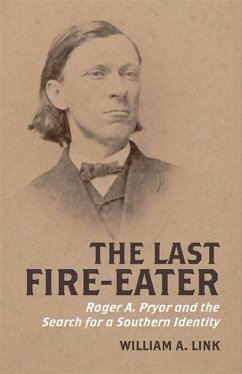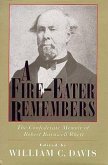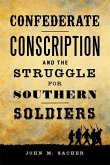"In The Last Southern Fire-Eater, renowned historian of the American South William Link examines the life of Roger Atkinson Pryor-a Virginia secessionist, Civil War general, and earnest advocate of postwar sectional reconciliation. Link shows that Pryor's life involved a series of re-makings. As a newspaper editor and politician, Pryor began his career as a moderate but eventually enthusiastically endorsed secessionism and war. Unlike most "fire-eaters," the nickname for hyper dis-unionists, Pryor experienced the Civil War in ways in which the brutality of the conflict undermined his assumptions about honor, manhood, and the value of war. In the decades after the conflict, he moved from Virginia to New York City, where, in another remaking, he became a celebrity defense attorney and advocate of reconciliation between North and South. Exploring the paths of an intriguing figure like Pryor allows Link to show that his journey was in many ways like that of the South-puzzling and contradictory. Indeed, Link casts Pryor as a central, perhaps representative figure during a crucial period in southern history between the 1850s and the close of the nineteenth century. Like the South, Pryor remade himself with the changing times. An archetypical southern-rights advocate, Pryor became a skilled practitioner in the politics of honor. Engaging in duels, attempted and genuine, he portrayed the world through the cultural prism of southern honor and assumed a more militant and aggressive stance on slavery than his southern peers. Later, he served prominently in the Civil War, rising to the rank of brigadier general and seeing action across the eastern theater. Captured late in the war, Pryor abandoned his fiery persona and renounced fire-eater extremism. He then moved north to New York City, where he became a prominent lawyer and advocate for the sort of intersectional reconciliation that became a central facet of what southern boosters were calling the New South. As Link shows, Pryor's lifetime encompassed dizzying changes. Born during the presidential administration of John Quincy Adams, he died four months after the end of World War I. He witnessed fundamental transformations in the South in the destruction of slavery, the defeat of the Confederacy, and the redefinition of manhood and honor among elite white men who no longer relied on dueling or personal violence"--
Hinweis: Dieser Artikel kann nur an eine deutsche Lieferadresse ausgeliefert werden.
Hinweis: Dieser Artikel kann nur an eine deutsche Lieferadresse ausgeliefert werden.








